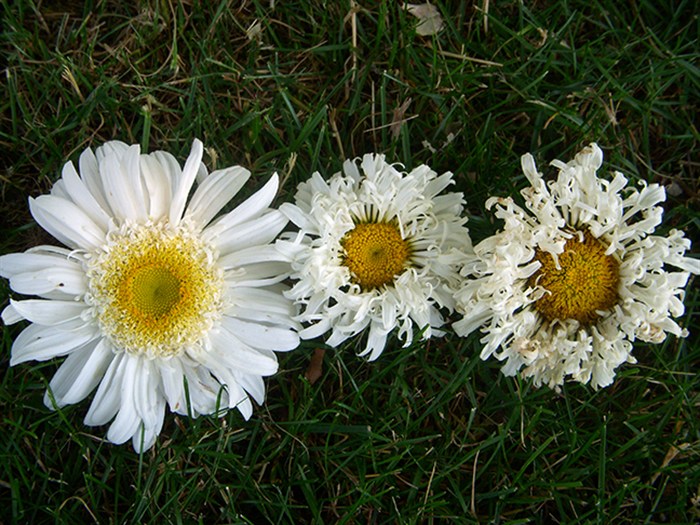Download
the pdf to read the complete issue illustrated here.
In this issue:
Pick-me-ups for pooped out potted
plants
Alternative liners for wire baskets
Big mistakes: Oops, that wasn't water!
Getting to the root of tree trouble
What's a girdling root?
More advice from our mentors
In our garden:
Deadheading,
clipping, or not!
Fertilizing
Coaxing trees' roots, stepping out
on tour
45 mph: Speedier than the average crab
Grins for serviceberry, grow-an for locust
This issue Sponsored by:
Potted flowers flag for lack
of fuss and fertilizer

Above: Perhaps it's hard to
believe, but these plants are having a tough time of it up
in the air and needy for nutrients in the soilless mix so
essential for good drainage in a pot. Without careful
attention in three areas, a container garden may be a bust
rather than a beauty. One focus should be on water,
including changing the frequency of watering as the plants
become larger. Equally important is regular fertilization
with a liquid that contains micronutrients. Third, we
deadhead and clip to keep new growth coming.
Download the
pdf to read the complete issue.
Alternative liners for wire
baskets

Above: We wrote recently about the
misunderstanding that caused people to think landscape
fabric would be useful as long term "weed control"
and how it does far more harm than good in the
landscape. In that issue of the newsletter we also
proposed a tongue-in-cheek list of alternative uses for
this black polyester cloth.
Reader Randy Zeilinger adds to that list: "Line
hanging baskets with landscape fabric to keep (soil in the
wire form or place it in a pot's bottom) to keep soil from
running out of the drain hole when watering. "
"However, instead of buying this awful product, you
can substitute newspapers (Janet: Or brown bags - above!)
and accomplish the same thing."
Download the pdf to read the complete issue
illustrated here.
Check trees for girdling
roots

Above: The sugar maple tree above, shows a flare on its left
face but a flattened
base that indicates a girdling root on the right.
Below: Sugar maple with girdling roots exposed.



Above: In the photo on the left
I've begun to clear soil from around the trunk to locate
the root or roots that are killing the maple above. On the
left, I've cleared further and dabbed paint on some
offending roots to help you see them. Girdling roots may
be much larger and indeed after removing those shown here I found a
much larger root that was the primary problem.
Download the pdf to read the complete issue
illustrated here.
Deadheading
To deadhead with confidence, learn to recognize spent
flowers and to distinguish between flower buds and seed pods. In a
daisy (below), the flowers are tiny yellow buds arranged in
concentric circles on the central disk. The outermost circle ripens
first (it's open on the lefthand flower above), showing powdery
yellow pollen (center flower) and then brown, aging tissue. When
the inner circles are showing pollen (right hand flower), it's high
time to clip that daisy stem even though the white petals we think
of as the flower are still intact.



Above: Don't waffle when you cut back that daisy.
Clip back to just above a large leaf (arrow). The
section of stem indicated by the arrow is enlarged,
right.
A stem's highest node (a node is the leaf-stem
junction) is the one most likely to produce a new
flowering stalk. If the leaf at that node is large, as
on this stalk, the new bloom it produces will
receive more food, have a thicker stem and more
robust flower.
In that lower node on this daisy stem a new flowering
stalk is already forming. If the seeds in the
current flower begin to ripen, that bud may be
aborted.

Above: From A to E, flower buds
(A), buds plus spent flowers (B), flower plus developing
seeds (C and D), and seed-only (E) on daylily stems.
If in doubt whether it's a bud or a pod, clip one
open. Flower buds are packed with petals, visible even
before they develop color. Pods contain seeds!
Download the pdf to read the complete issue
illustrated here.
This issue Sponsored by: Dot Wolff

For more Sponsor-recommended
articles...
Sponsor Us and tell us the topic you
are interested in.
We have posted a great deal of our library
already but have much still to post.
It helps to have Sponsors directing the sequence.

.